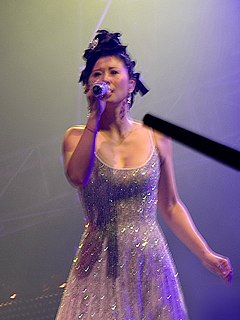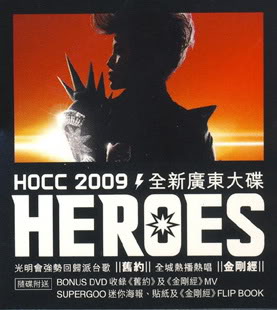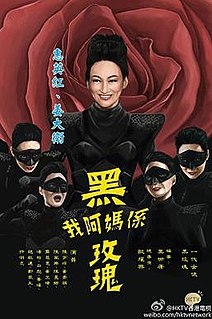
Hibari Misora was a Japanese singer, actress and cultural icon. She received a Medal of Honor for her contributions to music and for improving the welfare of the public, and was the first woman to receive the People's Honour Award, which was conferred posthumously for giving the public hope and encouragement after World War II.

Sally Yeh, sometimes credited as Sally Yip or Yip Sin-Man, is a Taiwanese-Canadian Cantopop diva and actress.

Priscilla Chan Wai-han is a Hong Kong-based veteran Pop diva who focuses on the genre of Cantopop throughout her musical career. She is renowned for her contralto singing voice, and her maturely clear, technically skilled and emotion-rich vocals.
Ryūkōka is a Japanese musical genre. The term originally denoted any kind of "popular music" in Japanese, and is the sinic reading of hayariuta, used for commercial music of Edo Period. Therefore, imayō, which was promoted by Emperor Go-Shirakawa in the Heian period, was a kind of ryūkōka. Today, however, ryūkōka refers specifically to Japanese popular music from the late 1920s through the early 1960s. Some of the roots of ryūkōka were developed from Western classical music. Ryūkōka ultimately split into two genres: enka and poppusu. Unlike enka, archetypal ryūkōka songs did not use the kobushi method of singing. Ryūkōka used legato. Bin Uehara and Yoshio Tabata are considered to be among the founders of the modern style of kobushi singing.

Paul Wong Koon-chung, known professionally as Paul Wong, is a Hong Kong musician, singer, songwriter and producer. He is the lead guitarist of the rock band Beyond, which has been disestablished since 2005. He earned the award "the Best Rock Singer (新城勁爆殿堂搖擺歌手大獎)" in Hit Awards (新城勁爆頒獎禮) 2012. He is also a member of Hong Kong Artistes Christian Fellowship (香港藝人之家).

Denise Ho Wan-see, is a Hong Kong-based Cantopop singer and actress, as well as a pro-democracy and Hong Kong human rights activist, a Canadian citizen. Ho has been blacklisted by the Government of China for her active participation in the 2014 Umbrella Movement in Hong Kong. Ho was the first "mainstream female singer in Hong Kong to come out of the closet" by announcing herself as a lesbian in 2012.

Hebe Tien is a Taiwanese singer and actress. She rose to fame in the early 2000s as a member of Taiwanese girl group S.H.E. The release of her debut album, To Hebe (2010), established her as a solo artist. Tien's song "A Little Happiness", the theme song of the 2015 Taiwanese film Our Times, was a major hit in most Mandarin-speaking parts of Asia.

Yan Yan Mak is a Hong Kong based female award-winning director.
Gold Typhoon Group is a Chinese entertainment company. Gold Label was founded in 2004 in Hong Kong, launched with the support of EMI, and acquired EMI Music Taiwan / EMI Music China in 2008, reforming to Gold Typhoon. On 1 January 2011, it became a wholly owned subsidiary of Pacific Global Management Asia (PGMA) under the leadership of Chairman Louis Pong.
Live in Unity is a series of concerts held by a Hong Kong female singer, Denise Ho (HOCC). It started on 26–28 October 2006 called "Hocc Live in Unity 2006" at Hong Kong Coliseum. Due to the great feedback from the audience, Ho continued the show by performing a part two on 19–20 January 2007 called "Hocc Live in Unity 2007" at the same venue. She started her world tour of the Live in Unity series on 14 January 2007 at Macau Fisherman's Wharf and extended it to Toronto in Canada and Atlantic City in the United States. The slogan and theme of Live in Unity are "We Stand As One" and to "Live in Unity".

Chiemi Eri, was a Japanese popular singer and actress.
Eason Chan is a Hong Kong singer and actor who has starred in multiple box-office hits. Chan started to act in films in 1997. He has since starred or co-starred in more than 20 films. He was nominated for Best Supporting Actor by the Golden Horse Film Awards in 2000 for his role in Lavender. In 2005, he was nominated for Best Actor by Golden Bauhinia Awards for his work in Crazy N' The City.
Ceremonies of the 19th Golden Melody Awards were held in Taipei, Taiwan in 2008. Nominees were announced on May 22, 2008, and the award winners in 12 traditional music categories and 23 popular music categories were selected by a panel of 33 judges after four rounds of jury meetings. Initially, there were 10,632 submissions from 185 companies in the music industry, making it the largest submission pool in the Awards' history.

Heroes is an album, by Denise Ho, released on October 8, 2009, the day before her concert “SUPERGOO’ at the Hong Kong Coliseum started. It's almost a year after her last album Ten Days in the Madhouse, her 2009 new album titled Heroes, backed by her songwriting partners Wyman Wong, Hanjin Tan, and her older brother, Harris Ho, Denise offers 10 new songs intended to empower listeners to find the superheroes within themselves and share the positive energy of each other. Main cuts on the album include the chart-topping first plug The Old Testament ("舊約"), and the concert’s theme song The Diamond Sutra ("金剛經"). The bonus music video DVD for this couple of songs are also included.
"The Moon Represents My Heart" is a Mandarin song. It was made famous by the Taiwanese singer Teresa Teng. The song often cited as "one of the most famous and beloved Chinese songs of all time".

Wallace Chung Hon-leung is a Hong Kong actor of Hakka ancestry.

Incredible Mama, is a 2015 superhero action comedy television series produced by Hong Kong Television Network. Originally 25 episodes, the series was condensed into 9. The first episode premiered on February 9, 2015.

Young Charioteers is a 2015 Hong Kong modern, romance, sports drama produced by TVB, starring Him Law, Sisley Choi, Sammy Sum and Michelle Yim as the main leads. Filmed on location in Hong Kong and Taiwan, the series began airing on March 2, 2015 and is broadcast weekly from Monday to Friday on TVB Jade channel 8:30-9:30 pm timeslot.
Asuka Ōkura, also known by the stage name Asca, is a Japanese musician signed to Sacra Music. She made her debut in 2013 after becoming a finalist at the 5th Animax All-Japan Anisong Grand Prix. After focusing on her studies, she resumed her music career in late 2016. Her songs have been featured in the anime series The Pet Girl of Sakurasou, Fate/Apocrypha, Sword Art Online, and Darwin's Game.
Chen Jia-wei (Chinese: 陳家偉; born 15 January 1985), better known by his stage name HUSH, is a Taiwanese singer-songwriter and lyricist.












